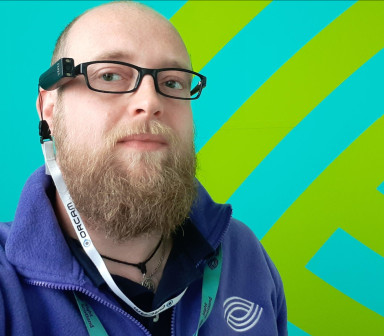Sight Scotland’s Kieran Crosby, who is severely dyslexic, has become the first UK user of the Orcam My Eye Pro 3.
Kieran, a Rehabilitation and Mobility Officer at Sight Scotland, from Edinburgh, has spent years helping individuals with vision impairments to navigate their daily lives. Despite his expertise in assisting others, Kieran himself faced significant challenges due to his severe dyslexia which greatly impacted his efficiency at work.
Earlier this year, in a groundbreaking move, Kieran became the first person in the UK to receive the Orcam MyEye Pro 3. This wearable assistive technology device is designed to empower individuals with vision impairments or dyslexia. It offers a comprehensive suite of features, including text reading, face and product recognition, colour identification, and smart magnification, enhancing daily independence.
The device, which is clipped onto a pair of glasses and communicates to you via an earpiece, has streamlined Kieran’s workflow allowing him to work more efficiently and effectively with service users.

"This has completely transformed my working life. I am severely dyslexic, which makes reading any document very challenging and time-consuming. By simply wearing the device and aiming it at text, I can have case files, emails, reports, Microsoft Teams messages, and other documents read aloud to me."
Kieran explains: "This has completely transformed my working life. I am severely dyslexic, which makes reading any document very challenging and time-consuming. By simply wearing the device and aiming it at text, I can have case files, emails, reports, Microsoft Teams messages, and other documents read aloud to me. This has significantly reduced the time and effort I spend on reading meaning I can now be more efficient and spend more time with service users. I recently read a book for the first time in my life, which is just incredible.”
He adds: “This device could also really enhance independence for someone with vision impairment, for example helping reading mail, identifying household items, managing medications, or following recipes. In public it could help with shopping, public transport, or attending social events. It has the potential to enhance the quality of life for individuals with vision impairments by providing tools that support independence, safety, and engagement with their environment.”
Colin Hilditch, Head of Community Services at Sight Scotland, comments: "Kieran faced challenges in his role due to severe dyslexia, so we were glad to support him by securing assistance from Access to Work and Orcam to obtain the Orcam My Eye Pro3. This device has enabled him to read case files, emails, reports, and Teams messages daily, tasks many of us take for granted. As a result, the quality of his service to clients has improved, reflecting our commitment to inclusivity and accommodating the needs of all employees. Additionally, this experience allows us to evaluate and recommend this technology for individuals with vision impairments, showcasing its great potential to assist."
You may also be interested in
Leah Takes A Jump To Better Life With Sight Scotland
Leah Cameron, 22, who suffered vision impairment through an acquired brain injury, is getting ready to take a big jump forward to say thank you to the charity which has transformed her life.
Lived Experience
Real-life experiences of those with sight loss and/or visual impairment give us an informed perspective from those directly affected by these conditions, so we're better able to influence policy and create campaigns that provide real, needed support.
Sight Scotland and Sight Scotland Veterans Appoint Paul Bott as New Chair of the Board
Sight Scotland and Sight Scotland Veterans are delighted to announce the appointment of Paul Bott as the new Chair of the Board.
Epilepsy Tablets Recalled After Joint Action From Sight Scotland, Sight Scotland Veterans and Epilepsy Scotland
Sight Scotland, Sight Scotland Veterans and Epilepsy Scotland have welcomed the news that the Medicines and Healthcare Products Regulatory Agency (MHRA) has recalled epilepsy medication that contained a braille error on the packaging.